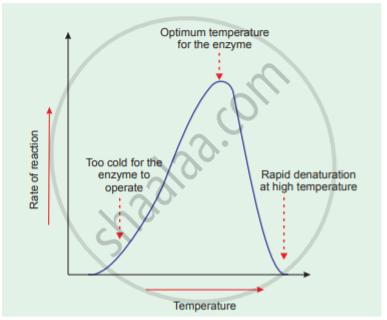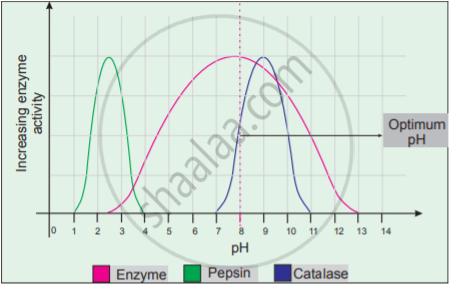Advertisements
Advertisements
Question
What are the factors affecting the rate of enzyme reaction?
Long Answer
Solution
- Temperature: Heating increases molecular motion. Thus the molecules of the substrate and enzyme move more quickly resulting in a greater probability of occurrence of the reaction. The temperature that promotes maximum activity is referred to as optimum temperature.

- pH: The optimum pH is that at which the maximum rate of reaction occurs. Thus the pH change leads to an alteration of enzyme shape, including the active site. If extremes of pH are encountered by an enzyme, then it will be denatured.

- Substrate Concentration: For a given enzyme concentration, the rate of an enzyme reaction increases with increasing substrate concentration.
- Enzyme Concentration: The rate of reaction is directly proportional to the enzyme concentration.

Rate of enzyme reaction
The Michaelis – Menton Constant (Km) and Its Significance:
When the initial rate of reaction of an enzyme is measured over a range of substrate concentrations (with a fixed amount of enzyme) and the results are plotted on a graph. With increasing substrate concentration, the velocity increases – rapidly at lower substrate concentrations. However, the rate increases progressively, above a certain concentration of the substrate the curve flattened out. No further increase in rate occurs. This shows that the enzyme is working at maximum velocity at this point. On the graph, this point of maximum velocity is shown as VMax.
shaalaa.com
Is there an error in this question or solution?
APPEARS IN
RELATED QUESTIONS
Define enzymes.
Protein part of the enzyme is known as ______.
Enzymes that catalyse the interconversion of optical, geometrical, or positional isomers are
Briefly outline the classification of enzymes
The word 'enzyme' refers to ______.
Match the enzymes with their respective substrates and choose the correct option.
| Column I | Column II | ||
| i. | pancreatic lipase | a. | Dipeptides |
| ii. | Nucleases | b. | Fats |
| iii. | Lactase | c. | Nucleic acids |
| iv. | Dipeptidases | d. | Lactose |
NADP is ____________.
From the following identify the condition/s that does not result in complete destruction of enzymes?
Enzyme sucrase belongs to which one of the following classes?
Choose the correct statement among the following.
